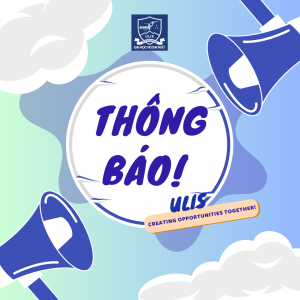VNU ULIS – SNHU Joint Training Master Program in TEFL training curriculum
The VNU ULIS – SNHU Joint Training Master Program in TEFL, comprising 14 courses, is offered in two stages: Stage I, delivered by lecturers from VNU ULIS and Stage II, delivered by lecturers from SNHU (USA), to Hanoi and Ho Chi Minh City campuses.
The program reinforces and promotes professional knowledge and skills for students at graduate level to meet the demand for professional development of teachers teaching English both at home and abroad.
Stage I. Courses given by VNU ULIS (to total 27 credits):
PG 01 Advanced Academic English Skills (6 credits)
This course includes four study areas: Academic English listening skills; Academic English presentation skills; Academic English reading skills; and Academic English writing skills.
The course further develops students’ academic English communication skills, especially those of academic English writing.
PG 02 Applied Linguistics (3 credits)
This course provides students with the body of knowledge relating to applied linguistics aspects such as psychological, sociological, language teaching and learning, interlanguage and translation and interpreting. The course will assist students in applying the learned knowledge and skills to their English teaching practice.
PG 03 Theories of Language Learning (3 credits)
This course provides students with the knowledge of current research trends relating to L1 and L2/FL acquisition. The course will empower students to apply the learned knowledge to EFL teaching as well as to investigating the process of language learning in general and foreign language learning in particular.
PG 04 Language Teaching Methodology (3 credits)
This course provides students with comprehensive theoretical aspects of language teaching methodology. The course makes an account of common methods and techniques for teaching language items and language skills to enable students to apply the learned knowledge and skills to their teaching. The course also offers students the opportunity to apply new English teaching methods in micro-peer-teaching practice and to discuss issues relating to English language teaching and classroom communication observation.
PG 05 Language Curriculum Design in TEFL (3 credits)
This course provides students with a theoretical basis for designing a foreign language curriculum in general and English language curriculum in particular. The course will empower students to design their own ELT curriculum and syllabus.
PG 06 Inter-Cultural Aspects in Foreign Language Teaching* (3 credits)
This course presents the body of knowledge relating to inter-cultural aspects between L1 and L2 to enable students to compare and explain culture-bound difficulties encountered in EFL teaching and learning.
PG 07 Language Testing* (3 credits)
This course explains theoretical basics of language testing to students. The course also describes types of test, methods of testing, stages and techniques of test designing and test administration.
PG 08 Internet in Foreign Language Teaching* (3 credits)
This course provides an overview of the most common uses of the Internet in ELT. Students are trained to exploit selected websites related to ELT to enhance their instruction.
PG 09 English for Specific Purposes*
(3 credits)
This course presents an overview of the nature and development of ESP, the fundamental approaches to ESP teaching and learning, ESP curriculum and syllabus design and evaluation of ESP curricula and syllabuses.
Note:
- Courses marked with * are electives.
- Students are to choose any three electives to complete the required 27 credits.
Stage II. Courses given by SNHU (to total 18 credits):
EFL 523 – Listening and Speaking Techniques (3 credits)
This course explains and describes listening and speaking activities and techniques for students with varying proficiency levels and includes teaching simulations by the instructor and participants.
EFL 525 – Reading and Writing Techniques (3 credits)
This course explains and describes reading and writing activities and techniques for students with varying proficiency levels and includes teaching simulations by the instructor and participants.
EFL 527 – Strategies/Techniques Teaching Grammar (3 credits)
This course will help students develop a deeper knowledge and understanding of English grammar in order to become more informed teachers. Students will review and discuss different approaches to the teaching of grammar, as well as how to create or adapt specific techniques for a variety of learning situations. The course will include teaching simulations by the instructor and the participants.
EFL 531 – Pronunciation Techniques (3 credits)
This course begins with a review of the International Phonetic Alphabet (the IPA) and the American English sound system and proceeds to a diagnosis of individual student pronunciation problems. Explanations and descriptions of techniques to improve pronunciation and activities to teach proper formation of consonants, vowels, and diphthongs will be given. Practice with connected speech, word/sentence stress, and intonation patterns will be emphasized through drama related activities. Also included are issues of first language interference and the design and implementation of lessons and curricula.
EFL 537 – Computer-Assisted Language Learning (3 credits)
This course provides a hands-on, collaborative environment in which to learn about and explore the use of computer technology for language learning. As much as possible, participants are encouraged to use various technologies examined in class to develop learning materials relevant to their current or future teaching contexts. Participants are also encouraged to use these technologies to collaborate with and engage other EFL/ESL professionals in learning about the theory, pedagogy, and application of CALL.
EFL 599 – Supervised Practice Teaching (3 credits)
Participants will have the opportunity to teach English lessons to 10 – 12 grade students at local Hanoi secondary school on the VNU campus. Participants will design and develop lesson plans and later present lessons. Group discussions, critiques, and suggestions will be made about the lessons and lesson plans by the supervising professor and peer participants in class. The course will focus on innovative, students focused, communicative lessons and lesson plans.

